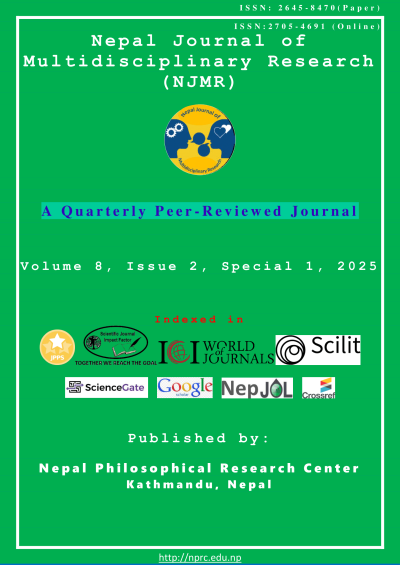Crafting Policies and Practices: Encouraging Academic Environment with Parental Support
DOI:
https://doi.org/10.3126/njmr.v8i2.76869Keywords:
Curriculum revision, infrastructure renovation, parents’ satisfaction, quality education, students’ satisfactionAbstract
Background: This study aims to investigate and identify the important aspects affecting educational quality in schools, emphasizing legislative provisions, infrastructure development, teaching-learning activities, and the role of school administration.
Methods: The research used a qualitative methodology to examine the obstacles and opportunities within community school education. Data was gathered from parents and students via group discussions, interviews, and written responses. Three distinct districts—Banke, Rupandehi, and Kaski—were purposively picked, with four schools from each district. Convenience sampling has been employed to include parents and students from grades eight to twelve.
Results: The results indicate that participants are mostly focused on policies concerning the establishment of the School Management Committee, the organization and substance of the school curriculum, and the local curriculum. Deficiencies in legal and educational policies impede quality improvement. Moreover, respondents emphasize the necessity for enhanced school infrastructure, teachers' commitment and attentiveness, and impartial oversight and discipline by head teachers to guarantee quality education.
Conclusion: Community schools in Nepal face criticism due to subpar results and inadequate performance in school-level education. To meet the stakeholders' requests, parents, students, and school families must maintain a coherent relationship.
Novelty: This study identifies the pressing necessity for developing policy provisions within the School Management Committee, revising the curriculum to integrate skills and knowledge, and local curriculum adjustments to ensure that skills are deemed as essential as knowledge and information. In contrast to prior studies, it employs thematic analysis and deduces the necessity for administrative discipline, impartial yet consistent teacher evaluations, and infrastructure refurbishment to ensure quality assurance.
Downloads
Downloads
Published
How to Cite
Issue
Section
License
Copyright (c) 2025 The Author(s)

This work is licensed under a Creative Commons Attribution-NonCommercial 4.0 International License.
This license enables reusers to distribute, remix, adapt, and build upon the material in any medium or format for noncommercial purposes only, and only so long as attribution is given to the creator.




